Filter by
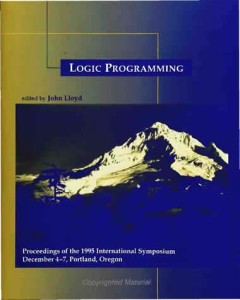
Logic Programming: The 1995 International Symposium
"December 4-7, 1995, Portland, Oregon The International Logic Programming Symposium is one of two major international conferences sponsored by the Association of Logic Programming. It is held annually in North America. The theme for the 1995 conference is "Declarative Systems," particularly the integration of the logic programming, functional programming, and object-oriented programming paradig…
- Edition
- 1
- ISBN/ISSN
- 9780262291248
- Collation
- -
- Series Title
- -
- Call Number
- -
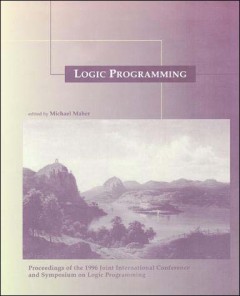
Logic Programming: Proceedings of the 1996 Joint International Conference and…
v
- Edition
- 1
- ISBN/ISSN
- 9780262291309
- Collation
- -
- Series Title
- -
- Call Number
- -
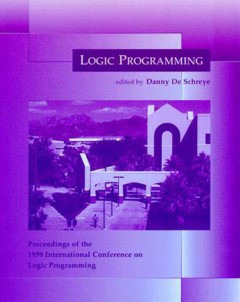
Logic Programming: Proceedings of the Tenth International Conference on Logic…
"The Tenth International Conference on Logic Programming, sponsored by the Association for Logic Programming, is a major forum for presentations of research, applications, and implementations in this important area of computer science. Logic programming is one of the most promising steps toward declarative programming and forms the theoretical basis of the programming language Prolog and its va…
- Edition
- 1
- ISBN/ISSN
- 9780262291460
- Collation
- -
- Series Title
- -
- Call Number
- -
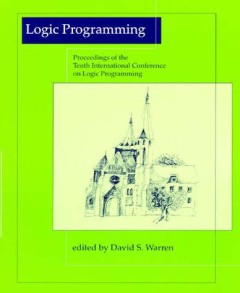
Logic Programming: Proceedings of the 1999 International Conference on Logic …
Includes tutorials, lectures, and refereed papers on all aspects of logic programming, including theoretical foundations, constraints, concurrency and parallelism, deductive databases, language design and implementation, nonmonotonic reasoning, and logic programming and the Internet.The International Conference on Logic Programming, sponsored by the Association for Logic Programming, includes t…
- Edition
- 1
- ISBN/ISSN
- 9780262291118
- Collation
- -
- Series Title
- -
- Call Number
- -
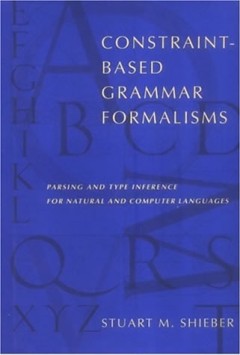
Constraint-Based Grammar Formalisms: Parsing and Type Inference for Natural a…
Constraint-Based Grammar Formalisms provides the first rigorous mathematical and computational basis for this important area. Constraint-based theories of grammar and grammar formalisms are becoming an increasingly widespread area of research in computational linguistics. Constraint-Based Grammar Formalisms provides the first rigorous mathematical and computational basis for this important area…
- Edition
- -
- ISBN/ISSN
- 9780262283519
- Collation
- 1 online resource (xi, 183 pages) :illustrations
- Series Title
- -
- Call Number
- -
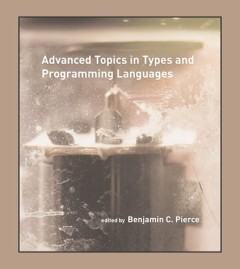
Advanced topics in types and programming languages
A thorough and accessible introduction to a range of key ideas in type systems for programming language.The study of type systems for programming languages now touches many areas of computer science, from language design and implementation to software engineering, network security, databases, and analysis of concurrent and distributed systems. This book offers accessible introductions to key id…
- Edition
- -
- ISBN/ISSN
- 9780262281591
- Collation
- 1 online resource (xiii, 574 pages) :illustrations
- Series Title
- -
- Call Number
- -
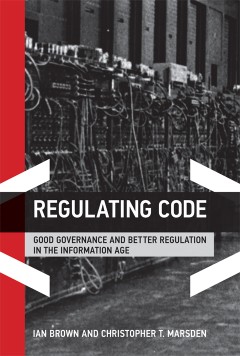
Regulating Code: Good Governance and Better Regulation in the Information Age
The case for a smarter “prosumer law” approach to Internet regulation that would better protect online innovation, public safety, and fundamental democratic rights. Internet use has become ubiquitous in the past two decades, but governments, legislators, and their regulatory agencies have struggled to keep up with the rapidly changing Internet technologies and uses. In this groundbreakin…
- Edition
- -
- ISBN/ISSN
- 9780262312943
- Collation
- -
- Series Title
- -
- Call Number
- -
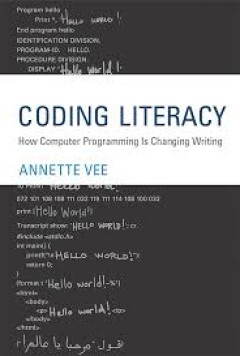
Coding literacy how computer programming is changing writing
The message from educators, the tech community, and even politicians is clear: everyone should learn to code. To emphasize the universality and importance of computer programming, promoters of coding for everyone often invoke the concept of "literacy," drawing parallels between reading and writing code and reading and writing text. In this book, Annette Vee examines the coding-as-literacy analo…
- Edition
- -
- ISBN/ISSN
- 9780262340236
- Collation
- 1 online resource (xi, 361 pages) :illustrations, maps.
- Series Title
- -
- Call Number
- -

Critical code studies :initial methods
"Critical Code Studies (CCS) names a set of methodologies for the exploration of computer source code using the hermeneutics of the humanities. Like 10 PRINT CHR$ (205.5 + RND (1)); : GOTO 10, Mark Marino's Critical Code Studies treats code not as merely functional but as a text, one that can be read, and misinterpreted, by non-programmers. As the author notes, code's "meaning is not determined…
- Edition
- -
- ISBN/ISSN
- 9780262357425
- Collation
- 1 online resource.
- Series Title
- -
- Call Number
- -

Software studies :a lexicon
This collection of short expository, critical and speculative texts offers a field guide to the cultural, political, social and aesthetic impact of software. Experts from a range of disciplines each take a key topic in software and the understanding of software, such as algorithms and logical structures.OCLC-licensed vendor bibliographic record.
- Edition
- -
- ISBN/ISSN
- 9780262273343
- Collation
- 1 online resource (xii, 334 pages) :illustrations.
- Series Title
- -
- Call Number
- -
 Computer Science, Information & General Works
Computer Science, Information & General Works  Philosophy & Psychology
Philosophy & Psychology  Religion
Religion  Social Sciences
Social Sciences  Language
Language  Pure Science
Pure Science  Applied Sciences
Applied Sciences  Art & Recreation
Art & Recreation  Literature
Literature  History & Geography
History & Geography